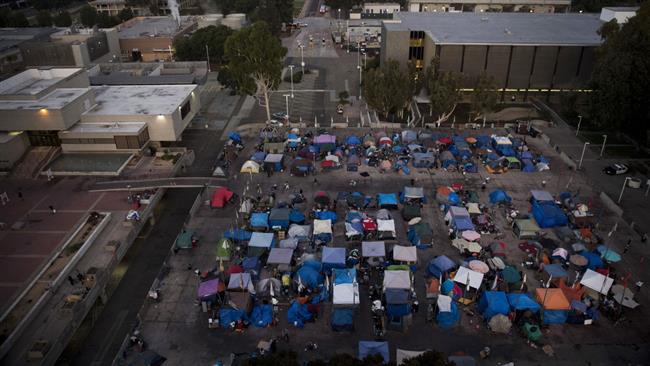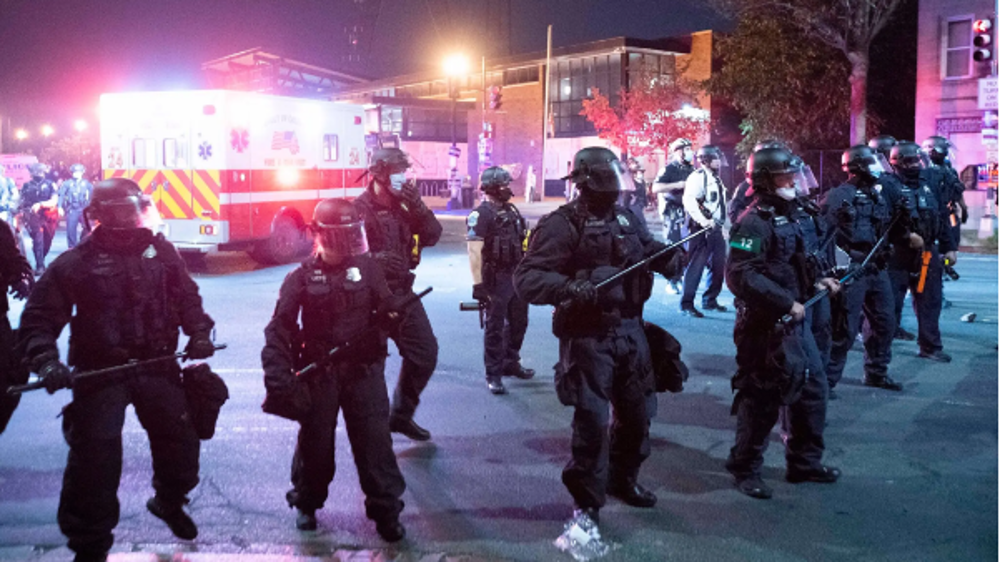US homelessness surges across West Coast: Report
A new report shows that many cities on the US West Coast are struggling with acute homelessness amid an unprecedented level of poverty and hardship in the region.
According to a report by The Associated Press on Monday, the number of homeless Americans has surged, with many sleeping in shelters or transitional housing with no safety net.
Over 105,000 people are sleeping unsheltered in some of the country's biggest and trendiest metropolises on any given night, driven there by soaring housing costs and rent and a booming tech economy that's leaving thousands behind, according to the AP.
Another 63,000 are sleeping in shelters or transitional housing with no safety net.
In Seattle alone, there are reportedly 400 unauthorized tent camps in parks, under bridges, on road medians and along busy sidewalks and dozens of campers lining streets around the city.
"I've got economically zero unemployment in my city, and I've got thousands of homeless people that actually are working and just can't afford housing," said Seattle City Councilman Mike O'Brien. "There's nowhere for these folks to move to. Every time we open up a new place, it fills up."

Several cities have already declared states of emergency amid public health concerns.
Even nonprofit workers, who have decades of experience with the homeless, are calling the situation along the West Coast "catastrophic."
"It's a sea of humanity crashing against services, and services at this point are overwhelmed, literally overwhelmed," said Jeremy Lemoine, who works for a Seattle nonprofit that provides various forms of assistance to the homeless. "It's catastrophic."
A new study conducted by the University of Washington and funded by the real estate information firm Zillow found a strong link between rising housing prices and growing homelessness numbers.
A 5 percent rent increase in Los Angeles, for example, would mean about 2,000 more homeless people there, the study said. The report also attributed poverty and housing prices to the tech industry, saying the boom comes with a consequence.
"Most homeless people I know aren't homeless because they're addicts," said Tammy Stephen, 54, who lives at a homeless encampment in Seattle. "Most people are homeless because they can't afford a place to live."
Many American cities are suffering from a sluggish economic recovery, stagnant or decreasing wages among the lowest-income earners and budget constraints for social welfare programs.
A lack of affordable housing, combined with falling wages at the lower end of the US pay scale, has been cited by analysts as a cause for homelessness in the US.
Russia may expand nuclear capability to counter US efforts: Russian diplomat
VIDEO | Press TV's news headlines
VIDEO | Palestinians voice support for resistance
Hamas says Deif, fellow leaders shattered Israel’s myth of invincibility
IRGC: Legacy of Qassam Brigades martyrs eradicating ‘cancerous tumor’ of Israel
Hamas warns Israel of ‘significant price’ before showing off seized Israeli gun
Egyptians protest against Trump’s scheme to relocate Gazans
Prisoner thanks Gazans after release, says Israel tortures Palestinians













 This makes it easy to access the Press TV website
This makes it easy to access the Press TV website